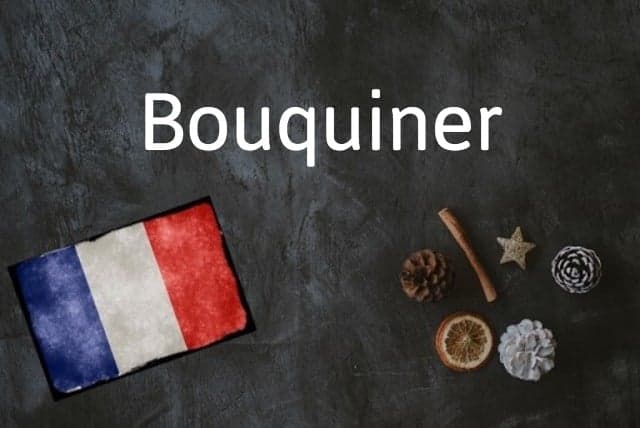French word of the day: Bouquiner

This is perhaps one of the most relaxing hobbies during lockdown. Just be sure to put your phone away first.
Why do I need to know bouquiner?
Because it gives new magic to an old habit.
What does it mean?
Bouquiner means lire - ‘read’.
But when you tap it into your Google search engine, the first explanation that comes up is fouiller dans les vieux livres - flipping through old books.
Bouquiner has something ancient and slightly magical about it. It's reading, but it's more than that. It's dusty old books filled with old wisdom, secrets and magic.
If you have been to Paris, you will have spotted les bouquinistes - booksellers of used and antiquarian books - in their green stalls along the Seine river banks.
It doesn't really have a synonym in English. Bouquiner is more than simply reading - it implies that you are reading and enjoying it.
Une personne en train de bouquiner s'adonne à cette activité de manière ininterrompue et avec a certain plaisir, states the French online dictionary l'Internaute.
'A person who is reading is doing it without interruptions and with a certain pleasure."
Maybe the closest in English is 'falling into a good book' and 'being absorbed in a great read' but it's not quite the same.
So if you're reading a book but checking your phone every five minutes, it's definitely not bouquiner.
Use it like this
If you're in lockdown and trying to get through the 10 books you wanted to read but didn't have the time to read over the past five years, pourquoi pas bouquiner un peu ? - Why not read a little?
Tu fais quoi? Je bouquine tranquillement dans le jardin. - What are you up to? I'm reading peacefully in the garden.
Il n'y a rien qui me détend plus en vacances que de bouquiner au bord de la piscine. - There's nothing that relaxes me more on holiday than reading by the pool.
Je bouquine toujours un peu avant de m'endormir. Comme ça je dors bien. - I always read a little before going to sleep. It helps me sleep well.
Comments (1)
See Also
Why do I need to know bouquiner?
Because it gives new magic to an old habit.
What does it mean?
Bouquiner means lire - ‘read’.
But when you tap it into your Google search engine, the first explanation that comes up is fouiller dans les vieux livres - flipping through old books.
Bouquiner has something ancient and slightly magical about it. It's reading, but it's more than that. It's dusty old books filled with old wisdom, secrets and magic.
It doesn't really have a synonym in English. Bouquiner is more than simply reading - it implies that you are reading and enjoying it.
Une personne en train de bouquiner s'adonne à cette activité de manière ininterrompue et avec a certain plaisir, states the French online dictionary l'Internaute.
'A person who is reading is doing it without interruptions and with a certain pleasure."
Maybe the closest in English is 'falling into a good book' and 'being absorbed in a great read' but it's not quite the same.
So if you're reading a book but checking your phone every five minutes, it's definitely not bouquiner.
Use it like this
Tu fais quoi? Je bouquine tranquillement dans le jardin. - What are you up to? I'm reading peacefully in the garden.
Il n'y a rien qui me détend plus en vacances que de bouquiner au bord de la piscine. - There's nothing that relaxes me more on holiday than reading by the pool.
Je bouquine toujours un peu avant de m'endormir. Comme ça je dors bien. - I always read a little before going to sleep. It helps me sleep well.
Join the conversation in our comments section below. Share your own views and experience and if you have a question or suggestion for our journalists then email us at [email protected].
Please keep comments civil, constructive and on topic – and make sure to read our terms of use before getting involved.
Please log in here to leave a comment.